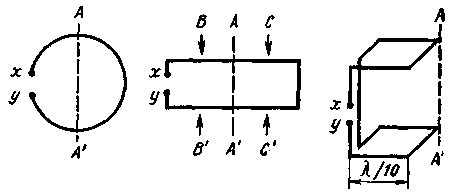Max Blumer (WA1MKP) suggested that the developed antenna occupying a minimum of space. The antenna is a loop with a perimeter equal to the wavelength.

The figure explains the intent of the designer of the antenna. As the basis was taken as a normal frame (left sketch) fed at points x and y. This frame radiates a vertically polarized wave in two perpendicular to the drawing plane directions, the maximum field strength is in the plane a-A'. The frame can be turned into a square, then (without significant loss of efficiency) in the rectangle (middle sketch). In this case the polarization of the wave and the orientation of the radiation will be the same as that of the round frame. If you fold this rectangle by 90° on the first line a-A', and then line-In' and C - C', flat loop will turn into a three-dimensional cube (right sketch). The perimeter of the antenna, of course, will be equal to the wavelength (L) and each side of the cube will be only 1/10L.
At the same time remain vertical polarization of the emitted wave, and instead of a bi-directional polar pattern will be obtained almost omnidirectional chart.
Set out the principle was first implemented in the form of band antenna 144 MHz. To power was used 50-Ohm coaxial cable with a matching unit (CWS range has varied from 1.2 to 1.4). A study of the pattern by using the field strength meter showed that there is an insignificant difference of the radiation back and forth (1,8 dB) and forward-sideways (3 dB), the latter apparently was due to the screening effect of the power cable and structural elements.
Then WA1MKP made a similar antenna on the 21 MHz band. She had the same features (though the CWS was slightly higher). In addition to QSO with other States in the U.S. have been conducted relating to South America and Europe.
Literature
Publication: www.cxem.net






